- Home
- Lauren Willig
The English Wife: A Novel Page 17
The English Wife: A Novel Read online
Page 17
“Mind the currents,” said Carrie, lifting her parasol over her head. “They can be dangerous for those who aren’t accustomed to them.”
ELEVEN
Cold Spring, 1899
January
A cold current of air snaked around Janie’s ankles, up beneath her skirt.
Downstairs, she could hear the old floorboards creaking as someone stepped inside.
Viola had heard it, too. Before Janie had time to say anything, the girl took off running, ruffled pantalets showing beneath her skirt, duck thumping behind her.
“Hello?” a male voice called. Then footsteps on the stairs. “Miss Van Duyvil?”
Janie hurried after Viola, catching up to her on the landing, where Mr. Burke’s head was just visible between the balusters. “Mr. Burke.” Relief made her sharp, mostly with herself. “How did you find us here?”
Viola gathered the duck in her arms, stepping back into the shadows.
Mr. Burke ventured the last few steps. He smiled winningly. “The dragon at the house sent me packing, so I decided to set up my own search party.”
Janie folded her arms across her chest. “You mean you were trespassing.”
Mr. Burke propped an elbow on the newel post. “You didn’t telephone for assistance last night.”
“In other words,” said Janie, “I didn’t provide you with an invitation and so you decided to invite yourself.”
“If I waited to be invited, I would never go anywhere.” Detaching himself from the banister, Mr. Burke stepped past her, holding out a hand to Viola in a businesslike fashion. “Hello. You must be Miss Viola?”
“Yes,” said Viola importantly. “And this is Polly the duck.”
Mr. Burke bowed to duck. “Hello, Miss Duck. It’s a delight to make your acquaintance.”
“She’s not Miss Duck. She’s the duck.”
“Miss the Duck,” Mr. Burke corrected himself gravely. “I do beg your pardon.”
Something that was almost a giggle escaped from Viola’s mouth. She considered a moment. “You may hold Polly.”
“Thank you kindly.” Mr. Burke gathered the wooden duck in his arms.
“No, you hold her by the string. Like this.”
As Viola demonstrated the proper method of duck-wrangling, Janie said quietly over her head, “Did your business prosper in Carmel?”
“That depends on what you mean by prosper.” The humor faded from Mr. Burke’s eyes as he straightened. He glanced down at Viola before saying, in carefully oblique terms, “The coroner intends to reopen the inquest shortly. You’re to be called as a witness.”
“I see.” Janie’s throat tightened. Standing up in front of strangers. To speak of her brother’s death. Taking refuge in sarcasm, she said, “How very kind of you to come all this way to tell me.”
“The soul of chivalry, that’s me,” said Mr. Burke. But he spoiled it by adding, with something very like real compassion, “The coroner seems like a reasonable man. It will be a few questions and over quickly.”
“Thank you.” Janie pressed her lips together, ashamed of showing weakness. “I’ve never seen an inquest before.”
Polly the duck thumped against Janie’s hem. Dark eyes glared up from grown-up to grown-up. “You’re not looking.”
Janie’s mother would have sent Janie to her room for interrupting an adult conversation—that is, if Janie had been allowed anywhere near adult entertainments. Mr. Burke appeared unperturbed. He doffed his hat, saying formally, “Miss Viola, I believe Miss the Duck needs a place to stretch her wings properly. Will you do me the honor of walking with me in the garden? We’ll let your aunt come, too.”
“How kind,” said Janie.
Softly, under cover of returning his hat to his head, Burke said, “There was something else.”
Janie could feel the prickles start in her fingertips. What else? What more? She felt as though she were blundering through a house in the dark, stumbling into rooms that were suddenly in the wrong places, tripping over furniture that had never been there.
“All right,” she said slowly. “Shall we, Viola?”
Viola hung back, Polly the duck’s string clutched tight in her fingers, her back to the lightly papered wall. “I don’t want to go.”
Had Viola been sneaking back to the old house, making a nest in the nurse’s bed? But Viola wouldn’t have made that fire. She wouldn’t have burned her mother’s letters.
“We can come back again.” Janie held out a hand to her niece, half expecting to be rejected. “I will take you back.”
Viola didn’t take her hand, but she did afford her a regal nod.
“My garden is this way,” Viola informed Mr. Burke and skipped off down the stairs with the obvious assumption that her retinue would follow.
Janie and Mr. Burke followed somewhat more sedately, proceeding in the proper way, Mr. Burke first, then Janie. From behind, Janie could see that his hat was well made, but worn. Aping the apparel of a gentleman, her mother would call it. Janie sometimes suspected her mother would be all in favor of sumptuary laws, statutes making it a penalty for the peasants to live like their betters. And mandatory coronets for all Van Duyvils, of course.
Mr. Burke paused at the bottom of the stairs, holding out a hand to help her alight.
She was tall for a woman. Mr. Burke was of average height. When Janie stood on the bottom step, she could look him directly in the eye. “What is it that you needed to tell me?”
Mr. Burke handed her down. “I don’t want to alarm you…”
Janie looked up at him with some annoyance. “There is nothing more alarming than being told one isn’t to be alarmed.”
Mr. Burke choked on a laugh. “And it was plain speaking you wanted, wasn’t it?” They followed after Viola to the back of the house, past furniture shrouded in sheets and the dim portraits of past Van Duyvils, painted by local artists who hadn’t quite got their perspective down, resulting in babies with bulbous heads and men with broad chests and tiny arms. “All right, then. I’ll be plain. There’s been an Englishman staying at Hudson House.”
“In the village?” She didn’t know Cold Spring well; it was dominated by the iron foundry, many of the houses company-owned, the shops on Main Street catering to the workers, not the neighboring gentry. The Van Duyvils had exercised their feudal prerogative on the countryside, not the village. “There are other Englishmen in the world.”
Some might even have perfectly legitimate reasons for visiting the village of Cold Spring.
“True.” Mr. Burke reached over Viola to help her with the latch on the door that led out onto the garden front. “He signed the register as Mr. Smith. Mr. George Smith.”
“How very inventive,” said Janie.
“Come this way,” demanded Viola, and then remembered herself. “If you please.”
This way was around the side of the house, where the old kitchen garden lay beneath a layer of frost, lavender plants bedded for winter, bare stalks tidied away. They had been practical people, Janie’s father’s family; there had never been formal gardens, save for her grandmother’s roses, bare stalks now, which had twined sweetly along the side of the house, sending their scent up to the windows above.
“If it makes you feel any better,” said Mr. Burke, pausing by the garden wall, “he’s not there now. At least, not at Hudson House.”
“That is not entirely reassuring, Mr. Burke.”
“It wasn’t meant to be.” Mr. Burke crossed the garden to her side in two brisk steps. “I didn’t think you’d thank me for false words of comfort.”
Janie glanced away, up at the bare windows of the house. Imagination presented her with the image of someone standing there, at the nursery window, watching.
Viola was playing a complicated game with Polly the duck, skipping in circles around the garden, engrossed in her own imaginings.
“I think someone might have been staying in the house, in the nursemaid’s room,” Janie said at last.
Mr. B
urke looked sharply at her. “Here?”
“There were ashes in the grate, and the coverlet was rumpled. Of course,” she added quickly, “there might well be a dozen other reasons.”
“Mice?” suggested Mr. Burke. “Rodents of unusual habits?”
“I doubt a rodent, even an unusual one, could manage the coal scuttle.” Raising her eyes to his, Janie felt her shoulders relax a little. “You don’t think I’m imagining horrors out of shadows?”
“When you’re living in a nightmare, even the shadows have claws.” The sun went behind a cloud, leaving the garden bleak and cold. More prosaically, Mr. Burke added, “No, I don’t. May I?” He gestured towards the house.
Janie tucked her cold hands beneath her arms. “You were planning to anyway, weren’t you?”
Mr. Burke’s lips crooked up on one side. “Perhaps. But,” he added with mock solemnity, “I imagine it would soothe your harrowed spirits to have a bit of male company about the place. I could be persuaded to join you for lunch. Purely for altruistic purposes.”
Altruistic her foot. “There won’t be anything elaborate. Mrs. Gerritt wasn’t expecting guests.”
“And didn’t I say my motives were selfless?” Mr. Burke leaned back against the base of her grandmother’s sundial, turning time to nothing. “I’ll settle for a loaf of bread, a jug of wine, and an apple beneath the bough.”
“The boughs are bare.” Something about Mr. Burke’s easy banter brought out the perverse in her. “And it’s a book of verses underneath the bough, a jug of wine, a loaf of bread, and thou.”
“That, too, then,” said Mr. Burke, unperturbed. Straightening, he added, “We may want the jug of wine before the day is over.”
“Are you planning to be particularly trying, Mr. Burke, or is it my company that cloys?”
She’d meant it as raillery, but it came out too close to home.
“Neither. Call it Dutch courage. Appropriate enough here, wouldn’t you say?” Mr. Burke gave his head a little shake, as though calling himself to order. “If you knew something unpleasant was about to happen, but you couldn’t do anything to stop it, would you want to know anyway?”
No, Janie wanted to say. There’d been enough unpleasantness to last a lifetime already. But what poor sort of character would that make her? She didn’t want to stick her fingers in her ears and let Troy burn around her. She would rather be out there with a bucket, flinging water at the flames.
“Yes, I would,” Janie said at last. “And you don’t know that you can’t stop it. I don’t believe anything’s really inevitable until it happens. We just call it inevitable to make ourselves feel better about it, to excuse ourselves for not having done anything.”
“Like your brother’s death?” Mr. Burke cast a wary eye on Viola, who was playing with Polly in and out of the legs of a stone bench. He moved to stand beside Janie, not touching her, but so close that she could feel the warmth of him through her coat. “There’s nothing you could have done.”
“How do you know?” The words wrenched out of her.
Janie pressed the back of her hand to her mouth, wishing she could take the words back. She hadn’t even known she was thinking them until she said them. But there it was. If she’d noticed Bay was missing … if she’d walked outside five minutes sooner … they would none of them be here.
Tightly, Janie said, “Tell me what you have to tell me, Mr. Burke. We’ve had enough theatrics.”
“Don’t you think I wish it were?” Mr. Burke lowered his head towards her, his words for her alone. “There’s another scandal about to break. Theodore Newland is citing your brother as a corespondent in his divorce.”
Newport, 1894
August
“I’m afraid there’s no card with this one.” Janie handed Georgie a silver sugar shaker, elaborately chased with bulbous flowers that might have been roses, as imagined by someone who had never seen one.
“Perhaps the sender was ashamed? I would be.”
Janie swallowed a chuckle. At least, Georgie thought, it might have wanted to be a chuckle when it grew up. “I’ll just put it on the list as unknown.”
Balked of a proper wedding, society had deliberated and deemed it necessary to send wedding presents anyway. No one wanted to be accused of stinting Bayard Van Duyvil of his due or being found wanting in the eyes of his English bride. Since gifts deserved a showing, Mrs. Van Duyvil the Elder had sent out cards for a ball in celebration of her son’s marriage. An entire room had been set aside for the display of society’s munificence.
Arranged for all to see were silver services crusted with the Van Duyvil acorns; gold-edged china from Limoges and whimsical figurines from Dresden; lace-trimmed tablecloths embroidered by nuns from Spain and blown-glass ornaments from Italy. And then there were the jewels, more than Georgie could wear in a lifetime: parures of garnets set in gold, aquamarines surrounded by seed pearls, combs and bracelets and pendants and rings.
Mother Van Duyvil had gifted her with a tiara—and promptly taken it back again. It was to be hers on loan, for the correct occasions.
“And when the time comes,” her new mother-in-law had said with a tight little smile.
That time being, presumably, when the dowager Mrs. Van Duyvil shuffled off the mortal coil, leaving a daughter-in-law trained in her ways to bear the family tiara.
The tiara was displayed in pride of place on a red velvet cushion so that all might gasp at her mother-in-law’s largesse. Largesse and approval.
It was a bit hard to remember that it was only four months ago that Georgie had been living in a garret room with peeling paper, with only the clothes on her back to call her own. And now diamonds. On loan.
That was nothing new, was it? Her life had always been on loan, a life lived on the fringes of Annabelle’s. A Miss Smith wasn’t on the same level as a Miss Lacey. Miss Smith took the chair farther from the fire, the smaller slice of cake, the plainer dress, and all because of an accident of birth that put her on one side of the bar sinister and Annabelle on the other.
How old was she when she had learned the truth? Georgie wasn’t quite sure. Sometimes it felt like she had always known. Was it Annabelle who had taunted her with it? Perhaps. There had been times when they had been the best of friends, but Annabelle, charming when so inclined, loving when in the mood, had been ruthless in crushing what she saw as any display of rebellion, with whatever weapon came into her arsenal.
Annabelle. How odd that after all that had passed, Georgie missed her still. Missed her and loved her and hated her, all in one.
What would Annabelle say to see her now, decked in silks and pearls, dining on gold plates?
So vulgar. But what would one expect of an American and an actress?
Bit by bit, Georgie found herself bringing Annabelle back, piecemeal, a gesture here, a turn of phrase there. She found herself adopting Annabelle’s mannerisms, her inflection, that haughty tilt of the chin, that devil-may-care grin she flashed over her shoulder just before she did something that was bound to get Georgie into trouble later on.
Some days, she could almost imagine that she was Annabelle. She would look into the mirror and see Annabelle’s face transposed onto her own. But it was only fair, wasn’t it? A life for a life, a Lacey for a Lacey. She’d paid her dues. Wasn’t it her turn to enjoy the benefits?
“Annabelle?” It took Georgie a moment to realize that her sister-in-law was speaking to her, that the sugar shaker was leaving rose-shaped dents in her palms. “Are you all right?”
Georgie gave her head a little shake. “Just away with the fairies. I stayed too late at that awful party at the Breakers last night. We ought to have left when you did. Did you know that—”
“That Mr. Newland put on an impromptu performance?” Janie’s only sign of distress was the two circles of color high on her cheeks. With her fair hair dressed simply in smooth loops on either side, it made her look more than ever like a Dutch doll. “Yes, I heard.”
Someone had sli
pped something into the punch, and Teddy Newland had serenaded his new fiancée with a lute purported to have belonged to Rizzio, the doomed lover of Mary, Queen of Scots.
“It was dreadful,” said Georgie bluntly. “If Rizzio sounded like that, I don’t wonder that Lord Darnley had him killed. He sounded like a stuck cat.”
Janie ducked her head over the stack of gifts. “We’re almost to the bottom. Would you like me to finish them for you so you can dress?”
“Many hands make light work,” said Georgie in Mrs. Van Duyvil’s most sententious tones, and this time Janie did smile, just a little.
“A servant in time saves nine?”
“If the servant is in time.” Georgie did her best imitation of Mrs. Van Duyvil, but if she’d hoped for confidences, the effort was wasted.
Janie handed her the next package, wide and heavy. “This one is from the Rheinlanders.”
Georgie hefted it. “What do you think’s in it, gold bars? Oh, how lovely. A silver tray.” That made eighteen of them. As casually as she could, she asked, “Did Bay ever pay court to Carrie Rheinlander?”
Janie glanced swiftly up at her. “Carrie can be a bit … temperamental,” she said, and Georgie was reminded that just because someone was quiet didn’t mean she was unaware. She had begun to suspect that her sister-in-law was a great deal shrewder than anyone gave her credit for.
She also wondered with just how many people Carrie had shared her belief that the new Mrs. Van Duyvil was a substitute for Anne. Not that Georgie believed a word of it. It was just mildly annoying, like a mosquito bite one couldn’t quite reach.
As she arranged the card in front of the tray, Janie said carefully, “We all played together as children. Bay was very close to Carrie’s brother, Charlie Ogden.”
Georgie racked her brains for a Mr. Ogden. She had met several, of various levels of paunch and floridity of face, but not a Charles that she could recall. “Have I met him?”

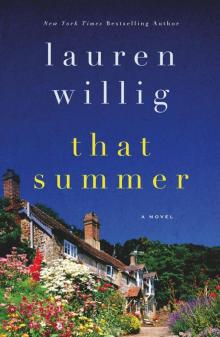 That Summer
That Summer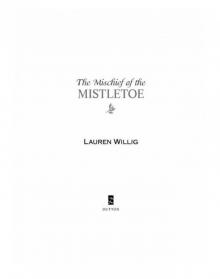 The Mischief of the Mistletoe
The Mischief of the Mistletoe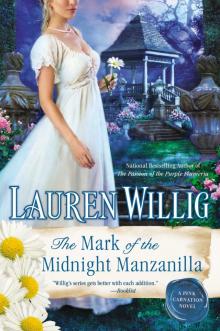 The Mark of the Midnight Manzanilla
The Mark of the Midnight Manzanilla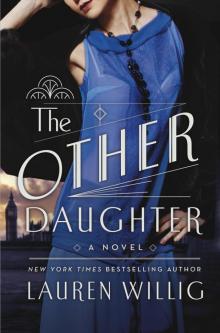 The Other Daughter
The Other Daughter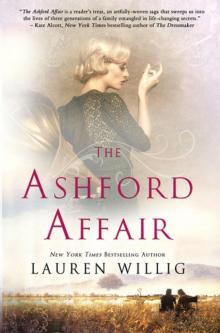 The Ashford Affair
The Ashford Affair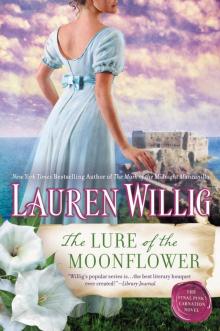 The Lure of the Moonflower
The Lure of the Moonflower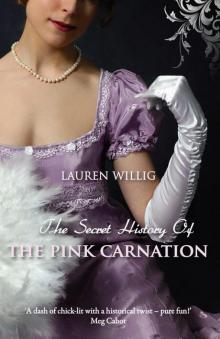 The Secret History of the Pink Carnation
The Secret History of the Pink Carnation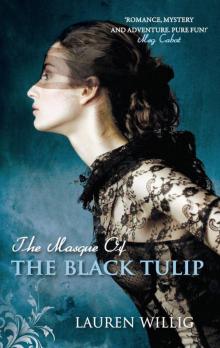 The Masque of the Black Tulip
The Masque of the Black Tulip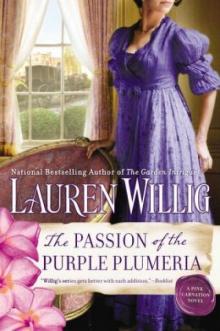 The Passion of the Purple Plumeria
The Passion of the Purple Plumeria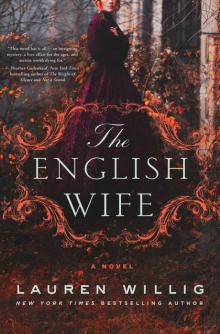 The English Wife
The English Wife The Garden Intrigue
The Garden Intrigue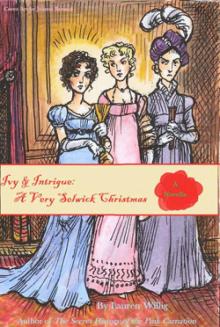 Ivy and Intrigue: A Very Selwick Christmas
Ivy and Intrigue: A Very Selwick Christmas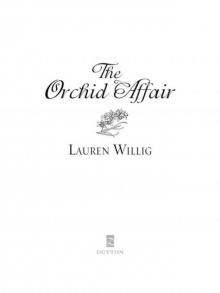 The Orchid Affair
The Orchid Affair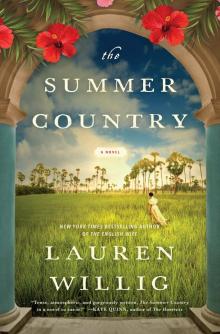 The Summer Country
The Summer Country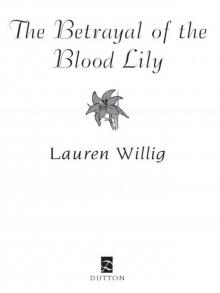 The Betrayal of the Blood Lily
The Betrayal of the Blood Lily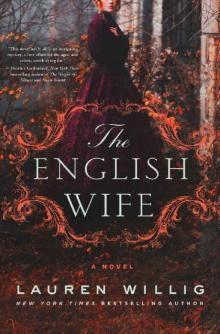 The English Wife: A Novel
The English Wife: A Novel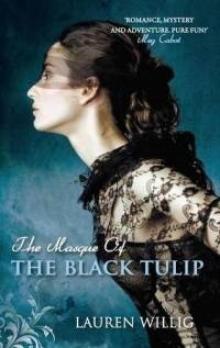 Masque of the Black Tulip pc-2
Masque of the Black Tulip pc-2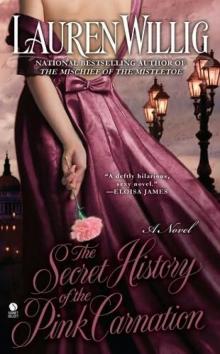 The Secret History of the Pink Carnation pc-1
The Secret History of the Pink Carnation pc-1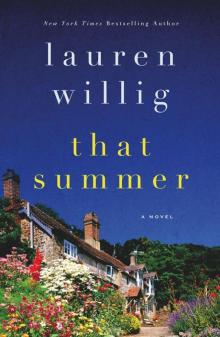 That Summer: A Novel
That Summer: A Novel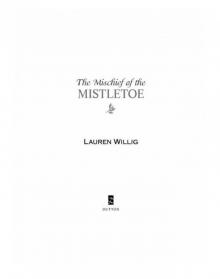 The Mischief of the Mistletoe: A Pink Carnation Christmas
The Mischief of the Mistletoe: A Pink Carnation Christmas